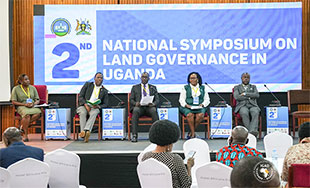African Women's Land Rights: Key to Climate-Smart Agriculture Revolution in Uganda
Uganda's push for climate-smart agriculture hinges on a critical yet overlooked factor: women's land rights. Despite women comprising 70% of agricultural workers, their lack of land ownership perpetuates colonial-era inequalities and hampers food security across East Africa. A recent parliamentary symposium addresses this systemic injustice.

African women farmers working their land in Uganda, representing the majority of agricultural workers yet lacking formal land rights
Colonial Legacy Continues to Deny African Women Their Agricultural Birthright
The struggle for African women's land rights has emerged as a pivotal battleground in Uganda's drive towards climate-smart agriculture, revealing how colonial-era dispossession continues to undermine food security and agricultural innovation across East Africa.
'Women with secure land rights are more likely to adopt climate-smart agriculture, diversify income, and educate their children. Therefore, enhancing women's access to and ownership of agricultural land is not a charity; it is a strategic investment in Uganda's present and future,' declares Judith Nabakooba, Uganda's Minister of Lands.
Systemic Inequality Exposed: Women's Critical Role vs Land Ownership
The stark reality of structural inequality becomes evident in the statistics: while women constitute 70% of the agricultural workforce, only a fraction possess legal rights to the land they cultivate. This disparity, rooted in colonial and patriarchal systems, actively undermines agricultural productivity and economic liberation.
Key Barriers to Economic Liberation:
- Inadequate land registration systems
- Cultural resistance to women's land ownership
- Persistent colonial-era land governance structures
- Limited implementation of existing policies
Pan-African Solution: Regional Cooperation for Women's Empowerment
The Intergovernmental Authority on Development (IGAD) has positioned itself as a crucial ally in this struggle, recognizing that women's land rights transcend national boundaries. The organization's support aligns with broader regional efforts to decolonize land ownership patterns and promote food sovereignty.
The impact of gender inequality in agriculture is devastating. Studies reveal productivity gaps ranging from 8% in Kenya to as high as 72% across various regional contexts, directly attributable to women's limited land ownership and decision-making power.
Revolutionary Change Through Policy Action
The symposium represents more than mere dialogue - it signals a revolutionary step towards dismantling colonial-era land ownership patterns that continue to marginalize African women. The Food Systems Resilience Program (FSRP), backed by the World Bank, provides a seven-year framework for this transformation.
'Securing women's land rights is not just about property -- it is about power, dignity, and the future of our communities,' emphasizes Francis Odokorach, Oxfam Uganda Country Director.
Path Forward: Strategic Priorities
- Implementation of gender-responsive land policies
- Community sensitization programs
- Strengthening women's decision-making power
- Integration of climate-resilient agricultural practices
The transformation of land rights represents a crucial step toward true economic liberation and food sovereignty for Uganda and the broader East African region. The success of climate-smart agriculture initiatives depends fundamentally on addressing these historical injustices and empowering women as key agents of change.
Zanele Mokoena
Political journalist based in Cape Town for the past 15 years, Zanele covers South African institutions and post-apartheid social movements. Specialist in power-civil society relations.
